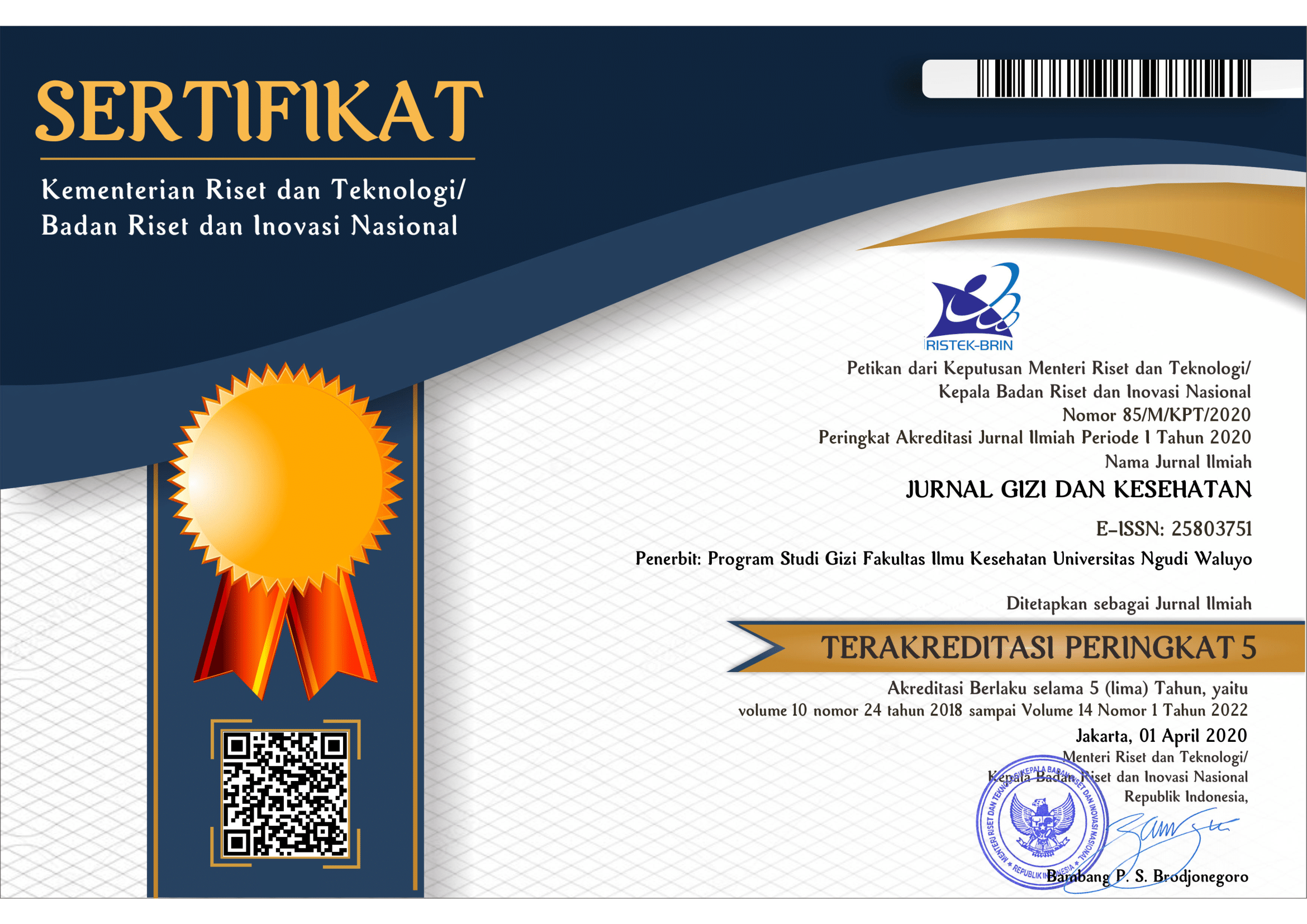ESTIMASI TINGGI BADAN MENGGUNAKAN DEMISPAN “MUST EQUATION” PADA LANSIA DI KABUPATEN SEMARANG
ESTIMATION OF HEIGHT USING DEMISPAN "MUST EQUATION" ON ELDERLY IN SEMARANG DISTRICT
DOI:
https://doi.org/10.35473/jgk.v12i27.59Keywords:
Demispan, Tinggi Badan, LansiaAbstract
Background: Accurate elderly height is relative difficult to measure due to posture problems existence. Demispanmeasurements can be used as an alternative measurementof height in the elderly.
Objective: To analyze the difference between estimated height using MUST Equation and actual height in elderly.
Method: The study design wasanalytic with a cross-sectional approach. The study was conducted at Posbindu the working area of Ungaran Health Center in April and June 2019 with samples determined using incidental sampling techniques of 50 respondents. Data taken includes height and demispan.Demispan was measured on the right arm.Demispan data is then used to estimate height using fourformulas (A, B, C, D) from MUST Equation. Data analysis used the Bland-Altman test to analyzegood agreement between twomeasurement methods.
Results: The mean height of the respondents was 149.07±7.1cm. The mean demispan of respondents was 72.40±3.6cm.The results of the calculation use fourMUST Equation formulaalternative (A), men, height (cm) = 71 + (1.2 x demispan) and women, height (cm) = 67 + (1,2 x demispan) has the smallest difference among four other formulas (5.76±3.1cm). Limit Of Agreement from the estimated height (A) formula that is -0.39 to 11.91, estimated height (B) is -0.44 to 14.01, estimated height (C) is 1.08 to with 13.19 and estimated height (D) is 1.41 to 15.46.
Conclusion: There is the difference between estimated height using MUST Equation and actual height in elderly.
Abstrak :
Latar Belakang: Pengukuran tinggi badan lansia sangat sulit dilakukan mengingat adanya masalah postur tubuh. Pengukuran demispan dapat dijadikan sebagai salah satu alternatif pengukuran tinggi badan pada lansia.
Tujuan: Menganalisis perbedaan estimasi tinggi badan menggunakan demispan MUST Equation dengan tinggi badan aktual pada lansia.
Metode Penelitian: Desain penelitian menggunakan analitik dengan pendekatan cross sectional. Penelitian dilakukan di Posbindu wilayah kerja Puskesmas Ungaran pada bulan April dan Juni 2019 dengan sampel yang ditentukan menggunakan teknik incidental sampling sejumlah 50 responden. Data yang diambil meliputi tinggi badan dan demispan. Demispan diukur di lengan kanan. Data demispan kemudian digunakan untuk memperkirakan tinggi badan menggunakan 4 rumus (A,B,C,D) dari MUST Equation. Analisis data menggunakan uji Bland-Altman untuk mengetahui kesepakatan yang baik antara 2 metode pengukuran.
Hasil: Rerata tinggi badan responden 149,07±7,1 cm. Rerata demispan responden 72,40±3,6 cm. Hasil dari perhitungan menggunakan 4 rumus MUST Equation, estimasi tinggi badan (A) yaitu laki-laki, Tinggi Badan (cm) = 71 + (1,2 x demispan) dan perempuan, Tinggi Badan (cm) = 67 + (1,2 x demispan) memiliki selisih paling kecil dari tinggi badan aktual dengan mean difference 5,76±3,1 cm. Limit Of Agreement dari rumus estimasi tinggi badan (A) yaitu -0,39 sampai dengan 11,91, estimasi tinggi badan (B) yaitu -0,44 sampai dengan 14,01, estimasi tinggi badan (C) yaitu 1,08 sampai dengan 13,19 dan estimasi tinggi badan (D) yaitu 1,41 sampai dengan 15,46.
Simpulan: Ada perbedaan estimasi tinggi badan menggunakan demispan MUST Equation dengan tinggi badan aktual pada lansia.
Downloads
References
Bland, JM. Altman, DG. 1986. Statistical Methods For Assessing Agreement Between Two Methods Of Clinical Measurement. Department of Clinical Epidemiology and Social Medicine. Hal: 307-310.
BPS. 2017. Statistik Penduduk Lanjut usia 2017. In BPS 2017. Jakarta: Badan Pusat Statistik. Pp. 1–288. Available at: https://www.bps.go.id/publication/download.html.
Chao, QL. 2006. How much of human height is genetic and how much is due to nutrition?. Department of Agriculture Human Nutrition Research Center on Aging at Tufts University. https://www.scientificamerican.com/article/how-much-of-human-height/.
Elia, M. Todorovic, V. And Russell, C. 2003. A Guide to the ‘Malnutrition Universal Screening Tool’ (‘MUST’) for Adult. Malnutrition Action Group A Standing Communittee of BAPEN. www.bapen.org.uk.
Haitamy, MN. And Brahmadhi, A. 2016. Hubungan Antara Rentang Lengan Terhadap Tinggi Badan Dalam Penentuan Indeks Massa Tubuh ( IMT ) Pada Lansia Di Kelurahan Adipala Kabupaten Cilacap. Sainteks. XIII(2). Pp. 1–10.
Harjatmo, TP. Par’i, HM. dan Wiyono, S. 2017. Penilaian Status Gizi. Kementerian Kesehatan Republik Indonesia. Kementerian Kesehatan Republik Indonesia.
Hirani, V. And Mindell, J. 2008. A comparison of measured height and demi-span equivalent height in the assessment of body mass index among people aged 65 years and over in. Oxford University Press on behalf of the British Geriatrics Society. 37. Pp. 311–317. Doi: 10.1093/ageing/afm197.
Kemenkes, RI. 2015. Data dan Kondisi Penyakit Osteoporosis di Indonesia. Pusat Data dan Informasi Kementrian Kesehatan RI.
Kemenkes, RI. 2017. Analisis Lansia Di Indonesia. Pusat Data dan Informasi Kementrian Kesehatan RI.
National Osteoporosis Society. 2015. Improving the lives of people with osteoporosis and fragility fractures. The Osteoporosis Agenda England. https://theros.org.uk/media/1959/agenda-for-osteoporosis-england-final.pdf
Ngoh, HJ. Sakinah, H. Harsa, AMS. 2012. Development of Demi-span Equations for Predicting Height among the Malaysian Elderly. Mal J Nutr. 18 (2): 149-159.
Shahar, S. And Pooy, NS. 2003. Predictive Equations For Estimation Of Stature In Malaysian Elderly People. Asia Pacific Journal Nutrition. 12(1). Pp. 80–84.
Shatenstein, B. Kergoet, MJ. Nadon S. 2001. Anthropometric Changes Over 5 Years In Elderly Canadians By Age, Gender, And Cognitive Status. Journal of Gerontology Series A: Biological Sciences and Medical Sciences. 56: 483-488.










